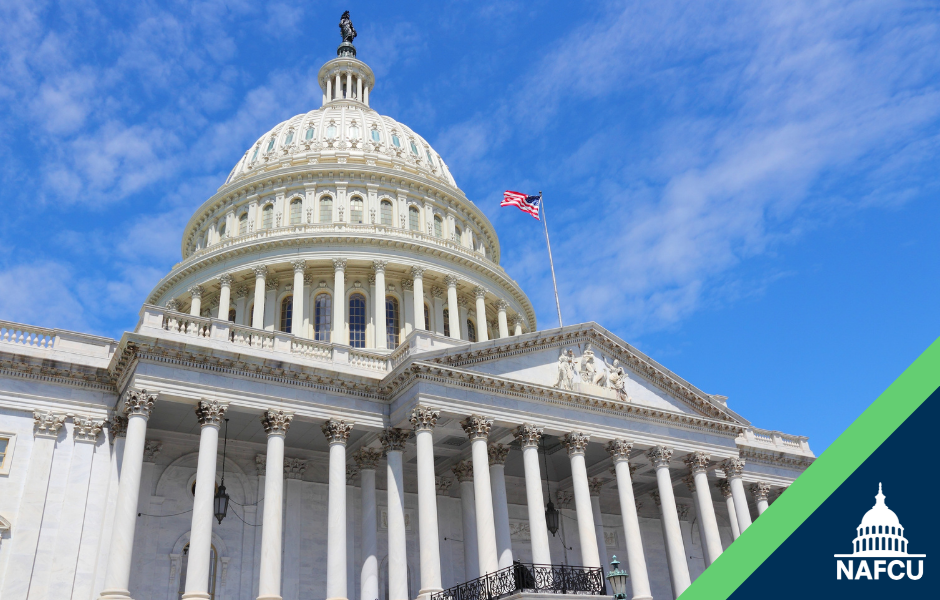Newsroom
NAFCU offers support for the inclusion of marijuana banking legislation in the America COMPETES Act
 NAFCU Vice President of Legislative Affairs Brad Thaler Wednesday wrote to the House to offer support for the inclusion of the Secure and Fair Enforcement (SAFE) Banking Act as an amendment to the America COMPETES Act as the House considers the package this week.
NAFCU Vice President of Legislative Affairs Brad Thaler Wednesday wrote to the House to offer support for the inclusion of the Secure and Fair Enforcement (SAFE) Banking Act as an amendment to the America COMPETES Act as the House considers the package this week.
In the letter, Thaler noted that NAFCU member credit unions in states that have authorized varying degrees of marijuana use are being approached by members, or potential members, seeking banking services for small businesses that serve the legal cannabis industry.
For financial institutions like credit unions, there are additional regulatory challenges that compound the uncertainty of providing financial services to state-authorized marijuana-related businesses (MRBs), noted Thaler.
"These go beyond just concerns about criminal or civil penalties, but also extend to requirements related to proper suspicious activity report (SAR) and anti-money laundering (AML) filings as related to the Bank Secrecy Act (BSA), access to federal deposit insurance and a Federal Reserve master account, and even potential issues with the Internal Revenue Service," wrote Thaler. "Missteps in these areas could prove devastating to an institution."
Though NAFCU does not have, and is not taking, a position on the broader question of the legalization or decriminalization of marijuana at any degree at the federal or state level, Thaler offered support for Congress taking steps found in the SAFE Banking Act to provide greater clarity and legal certainty at the federal level for credit unions that choose to provide financial services to state-authorized MRBs and ancillary businesses that may serve those businesses in states where such activity is legal.
NAFCU in 2021 updated its Marijuana Banking Issue Brief, where an update on the SAFE Banking Act is included.
Read Thaler’s full letter. The association will continue to keep credit unions updated of legislative and regulatory changes that could impact their operating environment.
Share This
Related Resources
Add to Calendar 2024-06-26 14:00:00 2024-06-26 14:00:00 Gallagher Executive Compensation and Benefits Survey About the Webinar The webinar will share trends in executive pay increases, annual bonuses, and nonqualified benefit plans. Learn how to use the data charts as well as make this data actionable in order to improve your retention strategy. You’ll hear directly from the survey project manager on how to maximize the data points to gain a competitive edge in the market. Key findings on: Total compensation by asset size Nonqualified benefit plans Bonus targets and metrics Prerequisites Demographics Board expenses Watch On-Demand Web NAFCU digital@nafcu.org America/New_York public
Gallagher Executive Compensation and Benefits Survey
preferred partner
Gallagher
Webinar
Add to Calendar 2024-06-21 09:00:00 2024-06-21 09:00:00 The Evolving Role of the CISO in Credit Unions Listen On: Key Takeaways: [01:30] Being able to properly implement risk management decisions, especially in the cyber age we live in, is incredibly important so CISOs have a lot of challenges here. [02:27] Having a leader who can really communicate cyber risks and understand how ready that institution is to deal with cyber events is incredibly important. [05:36] We need to be talking about risk openly. We need to be documenting and really understanding what remediating risk looks like and how you do that strategically. [16:38] Governance, risk, compliance, and adherence to regulatory controls are all being looked at much more closely. You are also seeing other technology that is coming into the fold directly responsible for helping CISOs navigate those waters. [18:28] The reaction from the governing bodies is directly related to the needs of the position. They’re trying to help make sure that we are positioned in a way that gets us the most possibility of success, maturing our postures and protecting the institutions. Web NAFCU digital@nafcu.org America/New_York public
The Evolving Role of the CISO in Credit Unions
preferred partner
DefenseStorm
Podcast
AI in Action: Redefining Disaster Preparedness and Financial Security
Strategy
preferred partner
Allied Solutions
Blog Post
Get daily updates.
Subscribe to NAFCU today.
